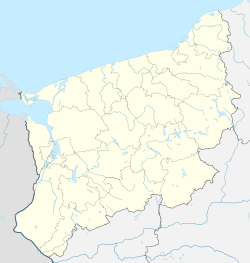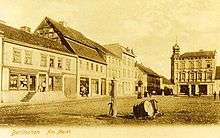Barlinek
Barlinek [barˈlʲinɛk] (German: Berlinchen) is a town in Myślibórz County, in West Pomeranian Voivodeship, in northwestern Poland. It is the administrative seat of Gmina Barlinek.
Barlinek | |
|---|---|
.jpg) Marketplace | |
 Coat of arms | |
 Barlinek  Barlinek | |
| Coordinates: 53°0′N 15°12′E | |
| Country | |
| Voivodeship | West Pomeranian |
| County | Myślibórz |
| Gmina | Barlinek |
| Town rights | 1278 |
| Government | |
| • Mayor | Dariusz Zieliński |
| Area | |
| • Total | 17.54 km2 (6.77 sq mi) |
| Population (2006) | |
| • Total | 14,156 |
| • Density | 810/km2 (2,100/sq mi) |
| Time zone | UTC+1 (CET) |
| • Summer (DST) | UTC+2 (CEST) |
| Postal code | 74-320 |
| Area code(s) | +48 95 |
| Car plates | ZMY |
| Website | http://www.barlinek.pl |
Geography
Barlinek is located in the northwestern part of the historic Greater Poland, later forming part of the historic New March region on the Płonia River, about 30 km (19 mi) north of Gorzów Wielkopolski. The town has 14,162 inhabitants (as of 2009).
History
A Slavic settlement existed in present-day Barlinek in the Middle Ages. The area formed part of Poland after the creation of the state in the 10th century.[1] It was part of the province of Greater Poland, before being annexed by the Margraviate of Brandenburg in the late 13th century.[1] The settlement of Nova Berlyn was first mentioned in a 1278 deed, when it was founded by the Ascanian margraves of Brandenburg. It was meant as a stronghold in the newly acquired Neumark region, bordering on the Pomeranian estates around nearby Pełczyce, which the margraves nevertheless conquered soon afterwards.

In the 14th century, the town gained its first fortified walls (still partly visible). In 1373 the town became part of the Lands of the Bohemian (Czech) Crown, ruled by the Luxembourg dynasty. In 1402, the Luxembourgs reached an agreement with Poland in Kraków. Poland was to buy and re-incorporate the region, but eventually the Luxembourgs sold it to the Teutonic Order[1]. In 1454 the Teutonic Knights sold the town to the Margraviate of Brandenburg in order to raise funds for war with Poland. From 1701 it belonged to the Kingdom of Prussia and between 1871 and 1945 it was part of Germany.[1] From the 18th century onwards the town prospered as a centre of brewing and cloth manufacturing.
After the defeat of Nazi Germany in World War II, the town was transferred to the Republic of Poland and renamed Barlinek. The remaining German population was expelled and the town was repopulated by Poles, many of whom were also expelled from former Eastern Poland annexed by the Soviet Union.
Notable people
- Karl Wilhelm Posselt (1815–1885) a German missionary active in South Africa
- Berthold Lasker (1860-1928) a German physician, writer and chess master.
- Emanuel Lasker (1868-1941) a German chess player, mathematician and philosopher; World Chess Champion from 1894 to 1921
- Józef Pilarz (1956–2008) a Polish politician, elected to the Sejm in 2005
- Dariusz Jarecki (born 1981) a Polish footballer, over 260 pro games
- Marcin Matkowski (born 1981) a Polish professional tennis player whose speciality is in doubles.
International relations
Barlinek is twinned with:
Gallery
- Barlinek Lake
.jpg) Gothic Church of the Immaculate Heart of Mary
Gothic Church of the Immaculate Heart of Mary- Medieval town walls
.jpg) Local museum
Local museum.jpg) Town hall
Town hall.jpg) Saint Boniface church
Saint Boniface church
External links
| Wikimedia Commons has media related to Barlinek. |
References
- "Barlinek - Historia miejscowości, Wirtualny Sztetl" (in Polish). Retrieved July 19, 2019.